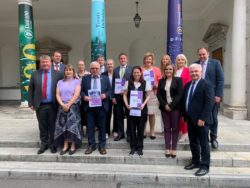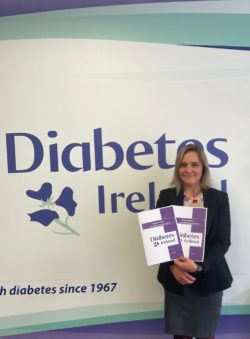TDs and Senators asked to support the call for the setting up of a Diabetes Taskforce to develop a 10-Year National Diabetes Strategy and take immediate actions to improve diabetes services:
the need to provide funding for the development of a National Diabetes Registry and
regular auditing of diabetes clinical services, so people with diabetes get access to similar standards of treatment and care regardless of where they live.
Today at a briefing in Leinster House, Oireachtas members heard directly from people living with diabetes about the issues and the barriers they face in trying to effectively manage their condition to the best of their ability.
Members of the Oireachtas heard about the difficulties faced trying to access HSE services and access new technologies primarily due to the lack of diabetes staffing resources around the country.
Shirley Garland and Audrey O’Neill, both mothers of children with Type 1 diabetes, highlighted the impact of being told of their child’s diagnosis, the anxiety, fear and loss they felt and the need for hope through the availability of best available care and technology to ensure their child’s well-being. They highlighted the lack of mental health support for families and the worries of transitioning from paediatric diabetes services to adult diabetes services which has much longer waiting lists and much more limited access to your diabetes team.
Grainne Flynn who has lived with Type 1 diabetes for 30 years highlighted the lack of access to diabetes education and the struggle faced by many people in getting access to diabetes technology which would vastly improve a person’s management and long-term quality of life.
Valerie Humphries, a person living with Type 2 diabetes, spoke about the increasing prevalence of diabetes, especially in people over 45 years of age and the challenges people face on a daily basis including the stigma associated with a Type 2 diabetes diagnosis and the need to plan more effectively for better diabetes care nationwide and to make it accessible to all people based on needs, not financial eligibility.
Diabetes Healthcare Professionals also highlighted the urgent need for data as part of the National Diabetes Registry and clinical audits. Data provision is necessary to improve care in Ireland, and to better plan diabetes health services as only then can appropriate interventions and decisions be made to address the multitude of issues. Members were told that the entire diabetes community, including health care professionals, people living with diabetes, the HSE National Diabetes Clinical Programmes for Adults and Paediatrics and Diabetes Ireland agree that these priority needs are fundamental to generating positive change in how diabetes care is provided thus the priority ask of Pre-Budget submission 2023 is to develop and implement a National Diabetes Registry and a National Paediatric Diabetes Audit to be expanded into adult diabetes services eventually as immediate actions.
Dr Kate Gajewska, Research and Advocacy Manager, Diabetes Ireland said: If the HSE wants to aspire to deliver high-quality diabetes care, they need to know how many people live with diabetes in Ireland and where those people live. They also need to regularly monitor the standard of clinical care being provided along with diabetes outcomes. Only then can they begin to effectively plan staffing resources, determine the cost of providing care and improve health outcomes for our community.
Kieran O’Leary, CEO, Diabetes Ireland also told members that to improve diabetes care, we need to collectively act now and look further down the road and decide what future care for people with diabetes will look like. He told members that we need to set up a diabetes task force similar to the one set up for the Cancer strategy and develop a 10-year National Diabetes Strategy that provides vision, leadership and direction so that we can recruit the staff required and improve the quality of life for people living with diabetes and reduce the long-term costs to the health service of diabetes complications.
Diabetes Ireland has also highlighted a number of other issues from its submission including the removal of the age restriction on the Flash Glucose Monitoring system, as Ireland is the only Western European country where this very well-accepted glucose monitoring technology is not available for people with type 1 diabetes and others with clinical need; the need to provide reimbursement of required medicines for women with gestational diabetes (GDM) to help protect both mother and baby, and the need for extra staffing resources so those people with diabetes who have to receive expert care and treatment in secondary care can get regular access to hospital diabetes services in line with national guidelines and HSE models of care. This would also improve access to timely diabetes education and diabetes technology based on clinical need.
Cormac Devlin TD, Chairperson of the Cross Parliamentary Group on Diabetes, who organised the briefing said: “Over the past 18 months, the Cross Parliamentary Group on diabetes has heard from many healthcare professionals and diabetes advocates on issues facing diabetes services currently and what is required to improve them. The evidence shows that more frequent medical review reduces health costs by preventing acute and chronic complications and inpatient hospital admissions. We recently had a positive meeting with the Minister for Health Stephen Donnelly on the need to prioritise the development and funding of future diabetes services and we look forward to hearing from him about this in the near future.
Issued September 21st 2022
To read more about Diabetes Ireland Pre-budget Submission 2023, click here.


